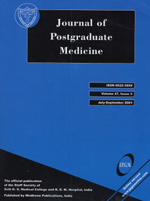
|
Journal of Postgraduate Medicine
Medknow Publications and Staff Society of Seth GS Medical College and KEM Hospital, Mumbai, India
ISSN: 0022-3859
EISSN: 0022-3859
Vol. 54, No. 3, 2008, pp. 195-198
|
 Bioline Code: jp08067
Bioline Code: jp08067
Full paper language: English
Document type: Research Article
Document available free of charge
|
|
|
Journal of Postgraduate Medicine, Vol. 54, No. 3, 2008, pp. 195-198
| en |
Effect of intravenous metoclopramide on intraocular pressure: A prospective, randomized, double-blind, placebo-controlled study
Sudheera, KS; Bhardwaj, N & Yaddanapudi, S
Abstract
Background: Prevention of rise in intraocular pressure (IOP) is essential in patients undergoing surgery for perforated eye injuries. Metoclopramide, a prokinetic agent, is commonly used to hasten gastric emptying in emergency surgeries.
Aim: To study the change in IOP after intravenous metoclopramide and to study the influence of metoclopramide on change in IOP after succinylcholine and tracheal intubation.
Settings and Design: A randomized, double-blind, placebo-controlled study of 60 patients undergoing non-ophthalmic elective surgery.
Materials and Methods: Sixty American Society of Anesthesiologists (ASA) I adult patients were randomly assigned to receive normal saline (Group C) or metoclopramide 10 mg (Group M) 30 min before the induction of anesthesia. Thiopentone was used for induction and succinylcholine for tracheal intubation. Intraocular pressure was measured in both the eyes pre and post drug treatment and succinylcholine and tracheal intubation using Perkins applanation tonometer.
Statistical Analysis: Student′s t-test and repeated measures ANOVA were used. A P value < 0.05 was considered as significant.
Results: Intraocular pressure was consistently lower in Group M than in Group C after the test drug, though the difference was not statistically significant. Intraocular pressure decreased significantly after administration of thiopentone and increased significantly in Groups C and M after tracheal intubation ( P < 0.01). Intraocular pressure was comparable between the groups at all the times.
Conclusions: Metoclopramide does not cause a clinically significant change in IOP nor does it influence the changes in IOP during anesthesia and tracheal intubation. Metoclopramide shows a trend towards decrease in IOP, though clinically insignificant. Therefore metoclopramide can be used to promote gastric emptying in patients with perforated eye injury.
Keywords
Emergency surgery, intraocular pressure, metoclopramide, perforated eye injury
|
| |
© Copyright 2008 Journal of Postgraduate Medicine.
Alternative site location: http://www.jpgmonline.com
|
|
